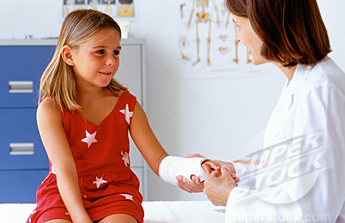What To Do When Your Child is Injured?


Image source
Being a parent can be rewarding at times – seeing our little ones smile, learn new things and grow brings us great joy and feelings of pride and accomplishment. However, parenting is a 24-7 job, with no coffee breaks or holidays (in fact, you will be working overtime to keep the kids in line during the holidays) and a very stressful one at that. We need to constantly watch over them to make sure they don’t get hurt, and any time we leave them with someone else or send them to school, there’s always that uneasy feeling that every mother feels – a sense of dread that something bad will happen. This is not just paranoia we are talking about here, since kids generally are a bit clumsy, impulsive and full of energy, when you put a bunch of them in one place you just have ”that” feeling that someone is going to get hurt. The thing most parents are concerned about these days is what to do when a child gets a more serious injury, while placed under the teachers care. Should legal action be taken, and when the school can be held responsible? These are the questions that will be answered in this article by examining some key factors.
1 What is the extent of the damage?
The good news is that for the most part only a few scrapes and bruises will result, and in a lot of cases only feelings get hurt. Hurt feelings, fear and anger can lead to psychological trauma and shouldn’t be taken lightly, but in the vast majority of cases a nice long talk and some chocolate milk (or a new video game, makeup, clothes – depending on the child’s age, gender or preferences) will help them quickly recover, and you can teach them a valuable lesson about life. Small children in particular have a very fragile psyche: they will perceive emotional distress as being the same as physical pain.
I mention this because it is important to get the facts straight when your child runs in through the door crying. First thing you should do is check for actual injuries. Bear in mind that a relatively insignificant cut on the finger can bleed severely, and bloody clothes can make you panic and look for injuries in the wrong place. This brings us to our next point.
2 Try to keep yourself calm
This helps put the child at ease by showing that you are prepared to deal with the situation and that you are confident in your ability to help the child. It is important not to let your emotions run wild as the child explains what happened. This isn’t the time to point a finger at someone, swear revenge on the school or blame some other kid’s parents. You need to get the facts straight, so you’ll know whether the school really is to blame and if you are justified in taking legal action.
3 Know the law
I spoke to Greg Smith from Smith’s Lawyers about the subject and he informed me that, at least in Australia, not only is it important where the accident happened (you can sue if it happened on school grounds or outside school, but under direct supervision of the teachers and/or other school officials, like on excursions) but what kind of activity the child was engaging in (if it is an activity strictly forbidden by the school and the child goes out of its way to disobey, then the school cannot be blamed) and how well supervised the children at the school where at that time. So, for example, if the child was engaged in an activity that is clearly dangerous or risky, like jumping over fences, running on desks or balancing on chairs, you might argue that it was unsupervised, but it was still doing something that it knows is dangerous and you will not have much success in pursuing a legal case against the school. A school will not be liable for injuries sustained in sporting activities. In case of schoolyard fights, you will need to prove it was a clear case of bullying and therefore an assault, rather than a fight in which both children took equal part, no matter who won in the end. You should also check your local laws, and consult a lawyer as the rules won’t be exactly the same everywhere.
So if your child comes home from school with an injury check how serious the injury is and whether a trip to the hospital is necessary. Then have a nice long talk, and try to get all the facts (what was the child doing, where did this activity take place, were there teachers around), while trying to remain as calm as possible. If necessary, take a few minutes to calm down, drink something to calm the nerves, clean up and bandage the child and then conduct the little interview. If you still aren’t quite sure whether you could or should sue the school, get some firsthand legal advice from a lawyer.
Michelle Lee is an ex-journalist and a blogging beginner from Perth. Although she is a working mom, she finds time to research and study the topics that are important to her, which are mostly health related. Having dealt with autism in her family, she understands what is really important in life, but she still enjoys “girly” stuff like fashion and cooking. Follow her posts @ecellulitis










